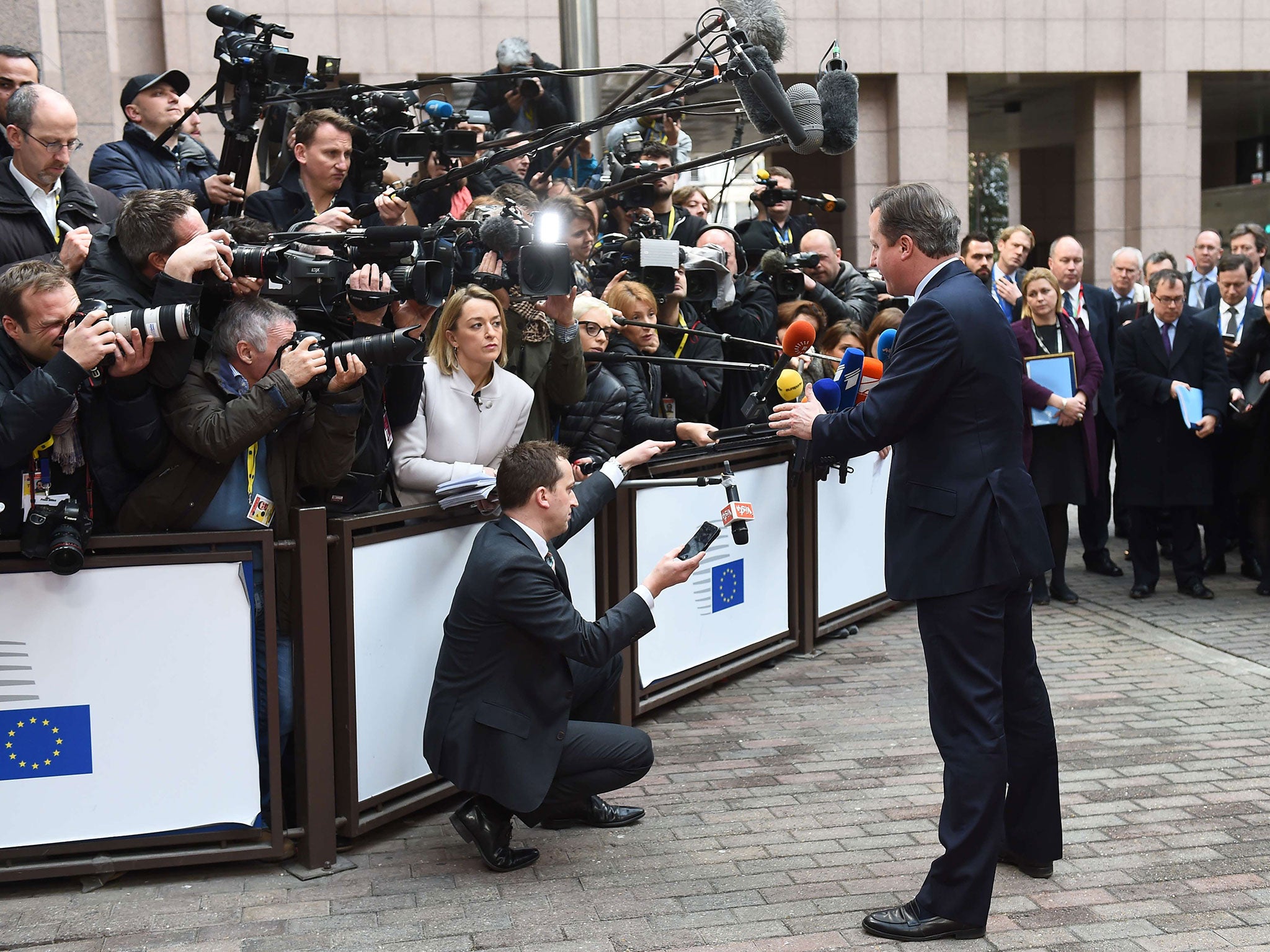David Cameron assures 'good progress' at EU talks despite fellow leaders calling migrant benefit reforms 'unworkable'
Prime Minister urges European heads of state to compromise on key issues the UK public 'care about'

David Cameron says "very good progress" has been made at a summit with his fellow EU leaders, but that talks to assure the UK's membership in the bloc will still be "very difficult" as other countries continue to reject his calls for benefit reforms for migrants.
He had earlier issued a direct appeal to his 27 fellow EU leaders to put themselves in the shoes of British voters and offer enough concessions to stop the country turning its back on more than 40 years of increasing European co-operation.
In a lengthy, highly political address to European heads of state over dinner in Brussels, Mr Cameron urged them to compromise on key issues the UK public “care about”.
But the Prime Minister was looking increasingly isolated on his totemic demand that Britain should be allowed to restrict in-work benefits to workers from other European countries for four years after they arrived in the country.
As they arrived for the European Council meeting in Brussels, leader after leader lined up to criticise Mr Cameron’s proposals as unworkable and against the fundamental tenants of the single market.
Significantly, the leaders of Poland, Hungary, Slovakia and the Czech Republic issued a joint statement, following a meeting with Mr Cameron ahead of the summit, rejecting any change to European Union laws that would lead to discrimination of their citizens or limit their freedom of movement.
“We consider the freedom of movement one of the fundamental values of the European Union, and proposals regarding this area remain the most sensitive issue for us,” they said. “In this respect, we will not support any solutions that would be discriminatory.”
The levels of migration we have seen in a relatively short period of time are unprecedented. This is a major concern of the British people that is undermining support for the EU
Mr Cameron is expected to come under significant pressure during the discussions to give ground and alter Britain’s own benefits system to a model similar to that used in other European countries. Such a contributory system would prevent EU migrants from claiming British benefits from day one, but would also have to apply to new UK entrants to the workforce such as school and university leavers.
Speaking ahead of the talks, a Government spokeswoman twice refused to say if this was an area on which Mr Cameron might be prepared to compromise in order to achieve a deal. His dilemma is compounded by the fact that the migrant benefits ban was included in the Conservative manifesto.
Downing Street sources expressed frustration that coverage of Mr Cameron’s renegotiation attempts have focused on the area of migrant benefits and not on other British demands, where more progress has been made among talks with officials.
On the EU dinner menu
Starter: Free-range chicken terrine with wild mushroom
Main course: Fillet of venison, parsnip mousse and Szechuan pepper jus
Dessert: Oranges marinated in spices with a calamondin foam
Coffee served with sernik
However, at the dinner Mr Cameron spent a significant chunk of his presentation addressing the issue of migration to Britain and asked other leader to understand the political concerns of voters.
“The levels of migration we have seen in a relatively short period of time are unprecedented,” he told them. “This is a major concern of the British people that is undermining support for the EU. We need to find an effective answer.”
Mr Cameron said that countries needed “flexibility” so that they could make “changes to their welfare systems to better manage migration”.
“We have got to address this worry of the British people that they will be taken against their will into a political project,” he said. “This is a fear that has undermined British public trust in the EU for a number of years.”
A Government spokeswoman added: “If leaders want to see Britain remain in the EU, then they should be thinking about the issues voters will be thinking about when they go to mark ‘remain’ or ‘leave’ in the referendum.”
But speaking to reporters at the European Council building in Brussels, the body’s president Donald Tusk said: “The consultations I have led with all member states shows goodwill of all the parties involved, but it doesn’t change the fact that some parts of the British proposal seem unacceptable,” he said.
“However, if Prime Minister Cameron persuades leaders tonight that we can work together to find solutions regarding all four baskets, then we will have a real chance to strike a deal in February.”
German Chancellor Angela Merkel said she expected EU leaders to have an open discussion, but “at the same time do not want to limit the basic liberties, non-discrimination and free movement of the European Union”.
French President François Hollande agreed, saying it would “not be acceptable to revise the very foundations of European commitments”.
Join our commenting forum
Join thought-provoking conversations, follow other Independent readers and see their replies
Comments